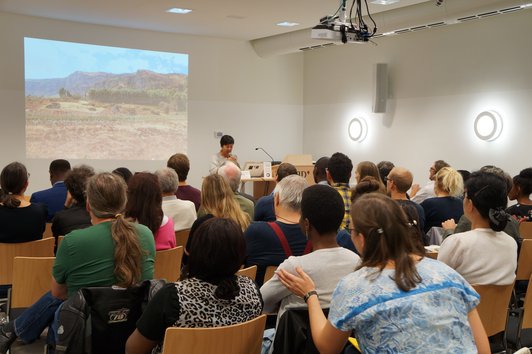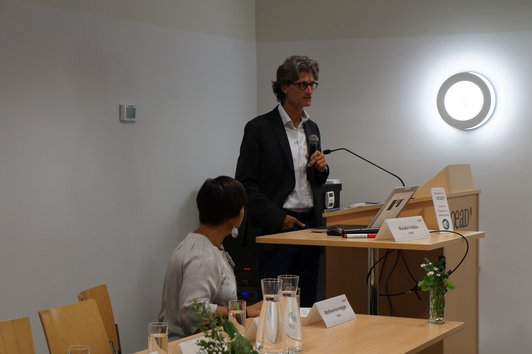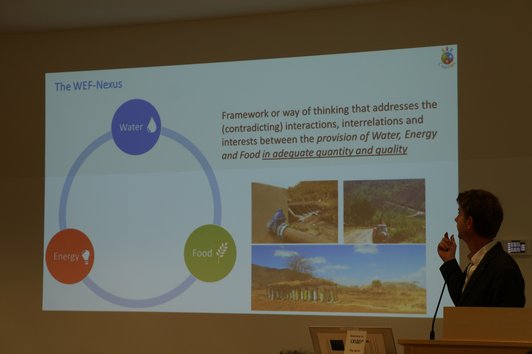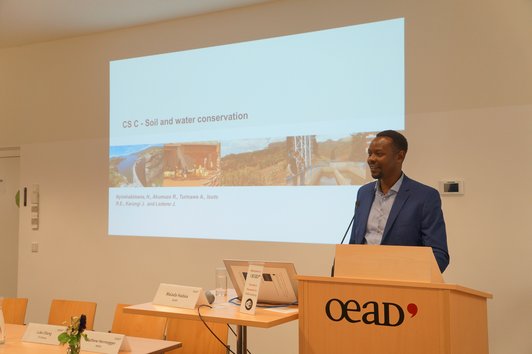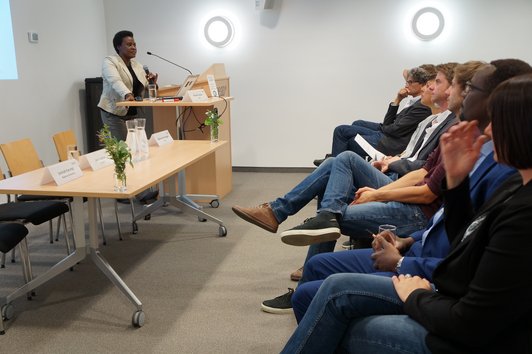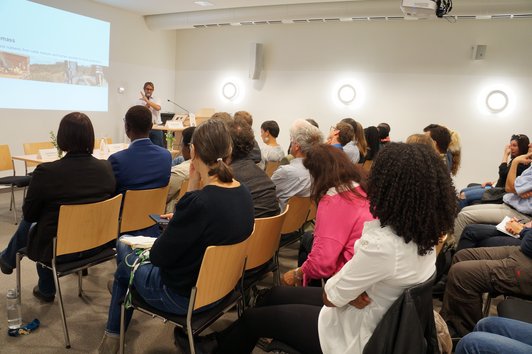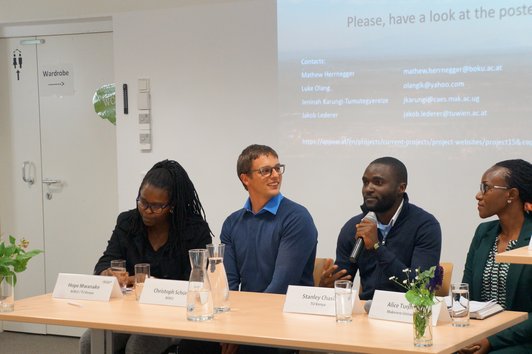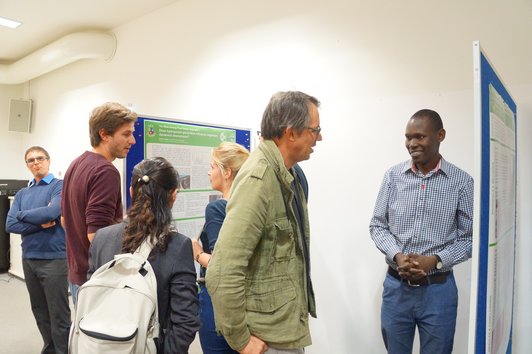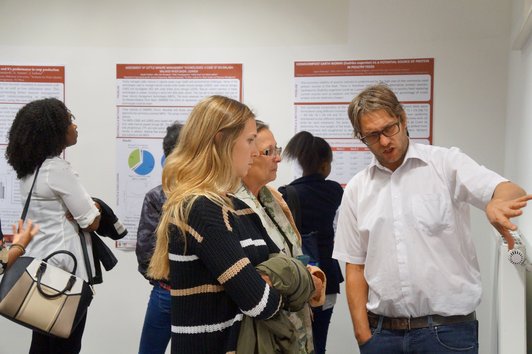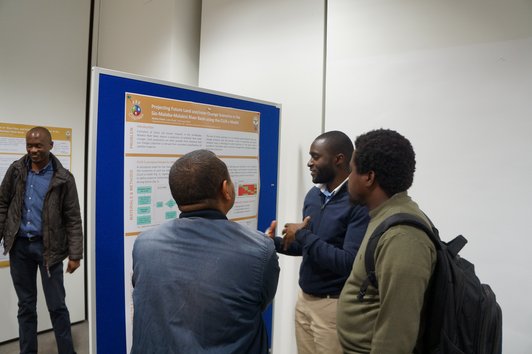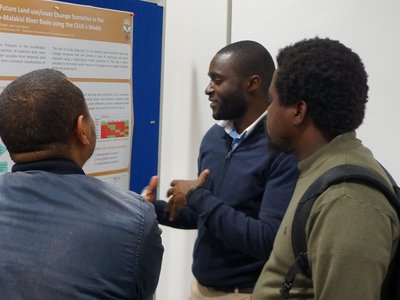

In his welcome remarks, Erwin Künzi, representing the Austrian Development Agency (ADA), highlighted the importance of inter- and transdisciplinary research, which CapNex puts into practice through its project team from four universities – TU Kenya, Makerere University, BOKU and TU Wien.
Mathew Herrnegger (BOKU) illustrated aspects of the complex interrelations of water, energy and food security, ranging from water supply, water quality, irrigation, land use, agricultural practices, erosion and nutrient flows to questions concerning the use and effects of hydropower. Working in the Nexus framework means bearing the larger system in mind and addressing the – often contradicting – interrelations between water, energy and food, so that all three of them can be provided in the amount and quality needed. Mathew then gave an overview of the project's research area, the Sio-Malaba-Malakisi River Basin, which is located in the Ugandan-Kenyan border region. It has a catchment area of more than 3000 km2, roughly comparable to the Mur catchment upstream of Zeltweg in Austria, and is characterised by a very high population density.
Luke Olang (TU Kenya and alumni of the North-South Dialogue scholarship programme) presented some general insights into research on the WEF nexus, and stressed how important it was to strengthen this component in development cooperation. After that, Jeninah Karungi (Makerere University) gave some details on current practices and future outlook on soil and water conservation by smallholder farmers in Kenya and Uganda. The results suggest that while a lot of information generated by research is potentially available to farmers, the adoption lag in uptaking this information and setting it into practice is a major threat to sustainable use of natural resources in East Africa and challenges the research uptake policies of development research. Finally, project coordinator Jakob Lederer (TU Wien) highlighted the role of the different case studies carried out in the project for the sustainable management of nutrients in farming systems. By using this example, he concluded that WEF nexus research should be more evidence based, sticking not so much to existing models, but also focusing on the particular problems with respect to competition on natural resources that exist on the ground, as these might be different in various situations.
CapNex brings together more than 20 researchers from Kenya, Uganda and Austria at various stages of their academic careers. Therefore, the second part of the event was designed to provide a stage for their work. In a short panel discussion, APPEAR scholar Hope Mwanake (TU Kenya / BOKU), Stanley Chasia (TU Kenya), Alice Turinawe (Makerere University) and Christoph Schürz (BOKU) talked about their motivation to conduct research in this field, about the challenges they encounter particularly during data collection, but also about the rewarding elements of their work. After that, the audience was invited to have a look at 16 poster presentation, which gave insights into the individual studies conducted within the project - including the investigations of APPEAR scholar Paul Omondi (TU Kenya / BOKU) - and to discuss them with the authors, most of whom were personally present.
It was this open setting during the poster presentations, the personal interaction with the researchers, which was appreciated the most by the audience, as the event evaluation suggests. When asked what they liked most about the event, many of the participants highlighted the poster presentations. Comments included, “that the many students involved in the project had the chance to exchange their experience”, “I liked the opportunity to have a real talk with students after their poster presentation” and “poster presentation was good and creates an opportunity to individual discussion with people involved in the project as well as among the participants.”
Pictures of the event can be found in the column on the right.
CapNex project website
---------------------------------
Speakers (in alphabetical order)
Mathew Herrnegger is a postdoc researcher in hydrology and water resource management at the University of Natural Resources and Life Sciences, Vienna (BOKU) in Austria. He claims himself a hunter-gatherer of (often incomplete or even inexistent) data, he calls for making use of all kinds of data sets even beyond disciplinary boundaries. Mathew coordinates the activities of BOKU on water management and soil erosion in the CapNex project.
Jeninah Karungi is associate professor for entomology and pest management at Makerere University in Uganda. Her research focus on ecological management of pests using the help of natural predators calls for an expansion of traditional definitions of natural resources in agriculture. Jeninah is the coordinator of Makerere Universities’ work on soil and water conservation as well as manure management in the CapNex project.
Jakob Lederer is a postdoc researcher in the field of recycling, waste and resource management at TU Wien. Being a dedicated, if sometimes – in his own words – amateurish, devotee to interdisciplinary research, Jakob has the privilege to coordinate the CapNex project on behalf of his university.
Luke Olang is senior lecturer in the fields of hydrology and water resource management at the Technical University of Kenya (TUK). His current research on climate variability in the Sub-Saharan African context highlights the vulnerability of rain-fed agriculture in the area. Together with Lewis Sitoki, hydro-biologist and senior lecturer on geoscience and the environment at the Technical University of Kenya, Luke coordinates the activities in the field of soil erosion and sediment modelling at TUK.
Facilitator: Maiada Hadaia, OeAD

